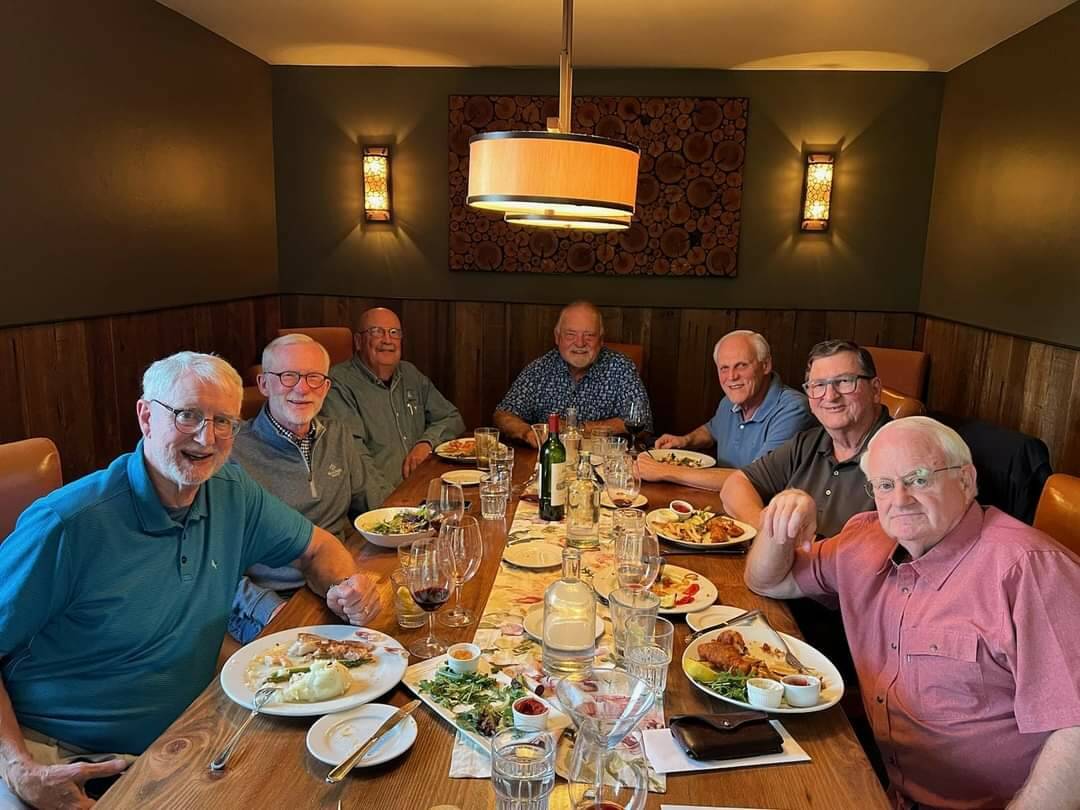Seven men. Mid-70s. A nice meal. A few drinks.
Over the past few years, I have met regularly with a group of old friends for dinner in our hometown of Lake Oswego, Oregon, which is kind of the Mercer Island of Portland.
We met again earlier this month. We are all clearly aging. But are we aging well? Our dinners are a chance to find out. We’re mostly retired now, although we all keep pretty busy.
We are the oldest of the Baby Boomers, born around 1946. Some of these guys I’ve known since kindergarten, others since elementary or junior-high school. We all graduated from high school in 1964 and entered different colleges. Some went on to law school, business school or other graduate studies. We call ourselves “Lake Oswego Lakers Still Hanging In There.” (The wry acronym is not suitable for a family paper, but it made us laugh!)
We’re a fairly diverse group who all had some success in life, including: an entrepreneur who started his own company; a lawyer who became a judge; a career military officer; a police chief; a communications director; a lawyer/lobbyist; and me, a lifelong journalist. Unable to join us this year were another lawyer whose wife is fighting cancer, a corporate executive who had prostate cancer, and another lobbyist who is having open-heart surgery.
We often begin by sharing our health issues, which seem a little worse each year. But this time we kept those reports short. We also agreed not to ramble on about our kids and grandkids (some of us don’t have any), our latest vacations, the last movie we saw, pets, or golf.
Since we are as divided politically as the rest of the country, we avoided talking politics. No mention of Trump or Biden! We talked about our volunteer activities, non-profits we support, and service projects we back. Some talked about their faith.
In an earlier email, I had suggested that we go around the table and answer these questions:
• What’s on your “Bucket List” of things you want to do before you die?
• What is the proudest accomplishment of your professional career?
• What is the proudest accomplishment of your personal life?
• What is your biggest regret?
• What would you like the rest of us to say about you when you’re gone?
Granted, men don’t usually talk about stuff like this, preferring to discuss sports, jobs, hobbies – and, of course, the women in our lives. We all are married, some of us more than once. But we did a pretty fair job of covering my questions, with a few side conversations and occasional monologues.
We all opened up to a remarkable degree. It was good to hear how everyone had found ways to give back and help others, including friends and family members.
Of course there were recollections of high-school days – crazy capers that adolescent boys find irresistible, such as trying to put a live cow inside the school during graduation week, blockading a major highway at 3 a.m. and running away when the police arrived, or skinny-dipping in the lake or backyard swimming pools. The tales brought roars of laughter and amazement that we didn’t suffer more serious consequences.
As we talked, I thought about another common element of aging: nostalgia. I had urged my friends to read “Brain Rules for Aging Well” by John Medina, a University of Washington affiliate professor of bioengineering who has written extensively about how our brains can be improved as we age. He recommends following what he calls “10 Principles for Staying Vital, Happy, and Sharp.” In previous columns, I have noted how he ranks friendship and gratitude above even exercise and diet as keys to longevity. He also insists that nostalgia is good for you.
The book describes a truly remarkable experiment: In 1981, a Harvard researcher named Ellen Langer took a group of 70-year-old men to a monastery where they spent a week in a kind of time warp — listening to music from the 1950s, watching black-and-white TV, and playing games they’d played as youths. The research team closely monitored their bodies and brains. When they started the experiment, they all had various infirmities – poor vision, bad hearing, faulty memory, etc. Some required canes to walk.
But after five days of reliving the past, “something dramatic had happened,” The New York Times reported. “Their posture was more robust. Their hands gripped more tightly. They handled objects with greater dexterity. They moved more easily. Their hearing had sharpened. Same with their vision.” Their brains had improved too, shown by several IQ and memory tests.
So, has my group of dinner buddies experienced similar results? Well, no, but we are all revitalized by our get-togethers. During this visit, I also drove through my old neighborhood and even toured my old grade school. We pledged to meet for dinner more often. We began planning our 60th high-school reunion next year.
Medina’s No. 1 Rule is: “Be a friend to others, and let others be a friend to you.” No. 2 is “Cultivate an attitude of gratitude.” To age well, you’ve got to have friends. Be thankful for them. They help keep us alive. Literally.
–
John Hamer is a retired editorial writer and columnist for The Seattle Times and co-founder of the Washington News Council. He is a member of Mercer Island Rotary, is in a book club and has many friends who are Still Hanging In There.


